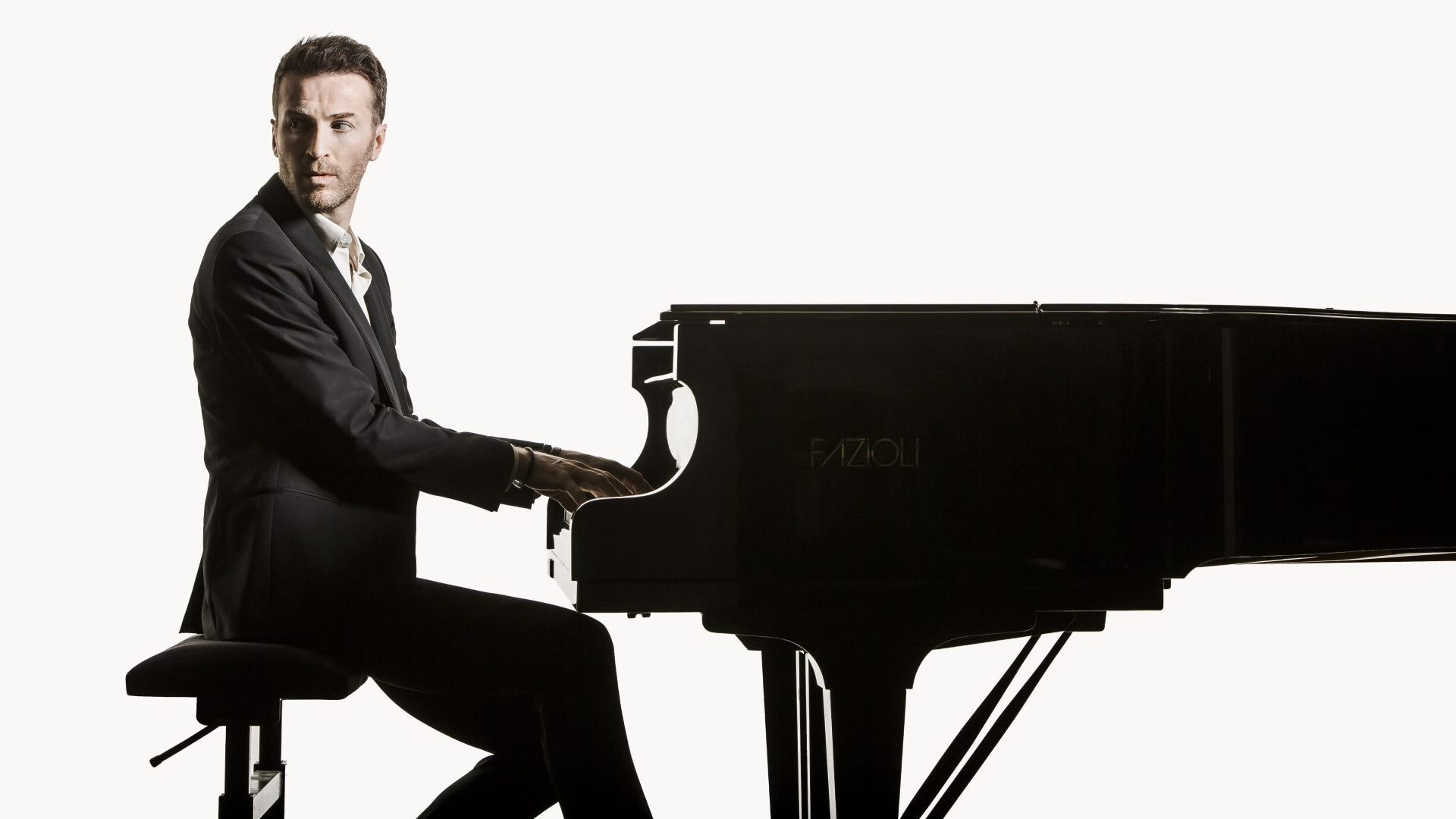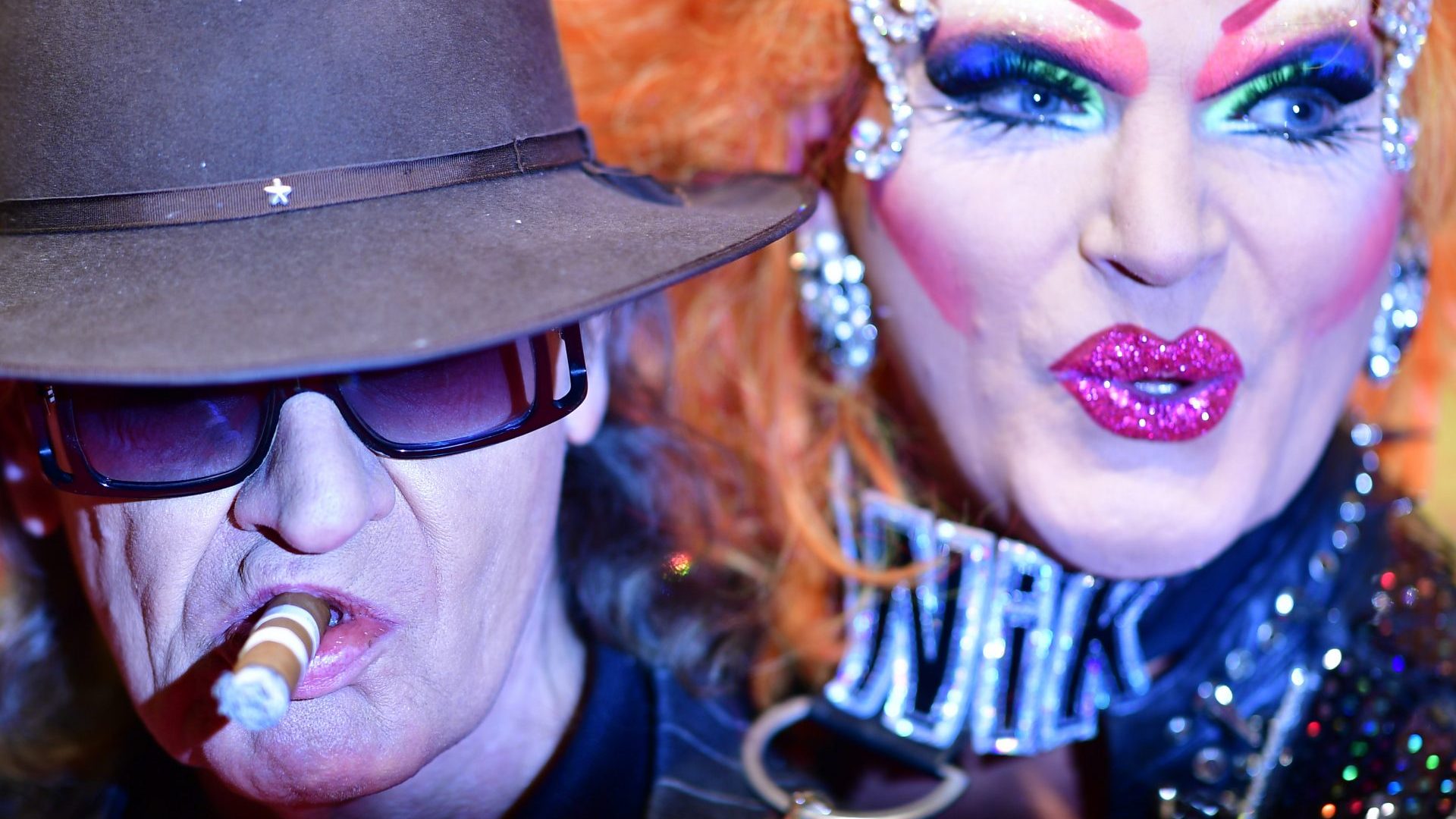I could have started this piece with any one of the striking anecdotes recounted by the chart-topping pianist and composer Riopy. Jean-Philippe Rio-Py – Riopy is a stage name – is an astonishingly open conversationalist. And we can safely say that this is a man who has lived. Brought up in a cult in rural France, his life story is an Odyssey of horror, from which he finally escapes through his art. Along the way there were the suicide attempts, the drugs, the yacht full of prostitutes in Ibiza, the homelessness in California, the cult members who tried to beat the individuality out of him as a child, the philosophy teacher paid to inform on him, the Catholic priest who tried to rape him, and Chris Martin, from Coldplay, who gave him a Steinway piano — the list just goes on.
And then there was the time when Riopy worked in a sadomasochist bar: “Handcuffs on the walls, big dildos… Politicians came, business people… It was a real gay gang-bang place.” Working in the seedy bar made famous as The Rectum in Monica Bellucci and Vincent Cassel’s film Irreversible was just one of many appalling jobs the British-French pianist took in his impoverished youth, jobs he happily describes, animated and jovial, as we talk in the deeply contrasting surrounds of London’s Langham hotel.
He has notched up big wins along the way. His soulful compositions feature in trailers for films such as The Danish Girl and The Shape of Water and award-winning adverts for brands from Peugeot to Armani. He’s played the Royal Albert Hall, secured the No 1 slot and two years in the top 10 of the US Billboard Classical charts – rare for a French instrumentalist. His recent world and European tour has segued into a tour of the United Kingdom, a fourth album is on the way and the award-winning American singer-songwriter Lana del Rey features one of his compositions on her new album.
But aside from the anecdotes and the accolades, the heart and soul of any discussion is the piano. Everything always comes back to the music that saved him.
“It’s always been a kind of therapy for me,” he says. “I feel a bit like it’s nature organising itself. When I play I feel my body trembling. I see images, there are feelings of hope and beauty, of something so huge it cancels everything else out to the extent that when I play like this anyone could come and talk to me and I wouldn’t even hear. It takes me to a place that stays in my mind. So when I was going through all that shit, I wasn’t there when I played. I think that’s what helped me keep my sanity.”
Riopy’s music has attracted praise for its emotional impact, the classy, deft playing and his ability to create transporting soundscapes. He has been described as a minimalist, and the attractive simplicity of his melodies, their rhythmic, hypnotic quality provides some affinity with the works of composers such as Max Richter, Ludovico Einaudi, Yann Tiersen and Arvo Pärt, as well as that of Michael Nyman, composer of the soundtrack for The Piano. But there’s also a connection with the reflective pop of artists such as del Rey.
Whatever we call it, his type of music has found an audience in today’s frenetic world for its soothing, therapeutic, style. Riopy’s over half a billion streams are no coincidence, and nor is the intense popularity of Einaudi, Part and others. Research during the Covid pandemic found young people listened to more classical music than a decade ago, from Mozart and Bach to “calming” classical-popular music, which provided reassurance at a time when the world seemed to be going mad.
It’s in this landscape that Riopy’s music sits. He’s been called a “captivating sonic storyteller”, with works far removed both from the intricate compositional spiders’ webs created by the classical masters, and the jarring, atonal output of modernists — and once you know his story it is obvious why. This meditative, moody style is a product of his own unsettled past life and a template for how he overcame the demons of his own past.
This is why, he says, he would never compose anything dissonant and refused to write for horror films — even though it’s a good way into the industry.
“Music in horror movies is very dissonant, very aggressive,” he winces. “I don’t want to bring this kind of power. I have been through so much that I want happiness and beauty and that’s what I share in my gigs.”
I first met Riopy at a private event in Shoreditch. Slight, energetic, with piercing eyes and a hint of stubble, he bounded onto the stage to share his new music with an expectant audience, excited to tell them that he has composed for strings for the first time.
It’s a starry culmination of a journey that began inauspiciously, nearly four decades ago, in rural France, where his mother, Muriel — barely out of her teens — decided to up sticks and take little Jean-Phillipe into a cult led by a brutal female guru with a penchant for thrones.
Living in various locations in the Deux-Sevres region in France, Riopy and his four siblings were among the group of up to 100 cult members who suffered physical and mental abuse. They were forced to chop trees and construct buildings. Music was banned, reading severely limited. Children couldn’t watch television or play with their peers. Often they had to sit immobile all day, and were regularly beaten and humiliated “to destroy our egos”. He grew up living in fear.
One day, he encountered an abandoned piano. “I pressed a key and it spoke to me,” he says. Entranced, he returned again and again, sometimes focusing just on one or two notes in percussive repetition. Music became an escape.
Riopy doesn’t recall his first piano – he’s spoken of “blackout” when it comes to what should have been his childhood. “I remember the one later, in the castle…”
“What?”
He laughs. “Yeah. We moved 12-13 times. We even lived in a fucking castle! With another family.”
“It had a very old piano and I was attaching strings with cotton to try and get the hammers to work,” he says. Ten-year-old Riopy composed music out of thin air: “For me music has to come from the heart. People say ‘oh that’s very stupid’, but it’s true. It’s like a code given at a certain moment. I’m not saying ‘it’s given by God’ but if you listen, you can hear, and that’s what I do.”
At that point, he was at school. The cult had to conform to some norms. How did his teachers not know what was going on?
They did, he says. At 13, he knew his childhood hadn’t been normal and that the reason was the cult. Their phones were tapped. The guru told them not to talk, that everyone was bad. “I never trusted anyone.” Nevertheless, he sometimes told teachers, but nothing happened.
When he was 17, two security service officers came to his girlfriend’s house and told him about the cult’s “horrific” activities, most of which he already knew.
He had been monitored. His philosophy teacher was paid to report on him. But as the cult wasn’t outwardly violent, and so nobody intervened.
“It’s very very hard to stop people because first you need proof, and who’s going to give you the proof? Because it goes against human rights or something,” he explains. “Whose human rights? Not mine.”
Although France prides itself in its laïcité or secularism, it isn’t immune to the quasi-religious cult movement imported from the United States. After the pandemic around 500 new cults were detected. While there has been a special watchdog dedicated for monitoring them for over two decades, there’s little concrete action as politicians struggle to balance religious freedom with preventing abuses. In 2019, te French actor Sarah Suco released a film inspired by her own experience growing up in a Catholic cult — Les Eblouis. Its English title was “The Dazzled”.
The cult that engulfed Riopy’s family no longer exists, but the guru, who oppressed them with her pick-and-mix version of religion, lives on. Similar cruel dynamics can exist anywhere, Riopy says, whether a French or US cult, around powerful people such as Harvey Weinstein, populist politicians or priests, or in abusive personal relationships.
“A cult is when you have an authority who says ‘trust me’, who’ll use every single technique to get you to do what they want…You’re brainwashed. They get this power that they feed off. The day you wake up is when you’ve been almost dead on the floor…”
The piano from the castle was eventually sold because he “played it too much”. Depressed without his only “friend”, he starved himself. Aged 18, Riopy escaped, after a dentist visit revealed he was physically suffering from intense stress. Life was hardly better. He was alone, penniless and homeless in Paris. All of this he explains cheerfully. “My first interview was at McDonalds — I didn’t even get that job.”
It was around this time that he became desperate enough to work in the sadomasochistic bar, which he isn’t squeamish about describing.
Riopy tells me he needed money and thought he’d just be checking coats. “It turned out it was in the cloakroom that they handed over ALL their clothes.” He pulls a face. He cleaned up the place afterwards, but refused to go downstairs where the action was. This didn’t stop people trying to lure him in. “I was young. Of course they were pushy. There was a power thing.”
Eternally optimistic, he went to Los Angeles, “for the American Dream, which is for everyone, right?” He was homeless again. A priest tried to rape him. A month later, he returned to Europe.
He somehow ended up in the UK, delivering pianos for a shop in Reading. A conversation when he was depressed led to an academic recommending he study contemporary music at Oxford Brookes University on a scholarship, and the subsequent launch of his career as a composer and performer. He played gigs in concert rooms and pubs, where his cinematic music was a hit.
One day, about 12 years ago, he was invited to play at a Vanity Fair dinner. “I was broke. They offered £1,000.” Gwyneth Paltrow was there, with her then husband, Chris Martin. When Martin came to congratulate him, Riopy, tongue-tied, blushed. He’d spent his LA years listening to Coldplay’s Parachutes as solace. A few weeks later, Martin bought him a Steinway. Still without a home, Riopy was “crashing” with his girlfriend, so the piano stayed in storage for two years. When Martin enquired about it, he would say “it’s great”.
He later used it to record his first album as his creative and commercial career took off. But what he thought would be his salvation, to make a living with music, wasn’t enough.
As he made connections, he became entangled in the lives of the rich and successful. “You go on private jets, to these islands. I remember being in Ibiza, we’re on this yacht, I see all these girls outside, my friend says well they’re all escorts…They’d say ‘you’re a man. A man fucks prostitutes. It’s normal’. Society was saying: make money, this is what success looks like.”
There were parties across the world, from the US to China. He drank and took drugs, “because I couldn’t cope with the reality destroying me. That’s how you create hell for yourself… I saw the greed and the jealousy and the envy — all the sins you can think of.”
One night he found himself flat on the road in London, full of self-loathing, handcuffed by police after doing “a Spider-Man impression,” which, he explains, meant climbing up things and hoping for a fatal fall.
His girlfriend rescued him, lying to keep him from a police cell. He realised he should marry her. He also realised that he should get out.
Riopy’s strategy included a mix of hot yoga, meditation and a vegetarian diet – his lifestyle finally converged with his music. It’s no coincidence his compositions feature on meditation and “calm” apps.
This added grist to the mill of those who consider his music not classical enough. That’s one reason he came to the UK, which he says is more open about music: “In France they said: ‘you don’t play Chopin? You’re not a musician. You’re a loser.”
Ironic, given that his upcoming album, Thrive, was inspired by Eric Satie’s Gymnopédies, and includes adaptations of Chopin, Beethoven, Debussy and Fauré. But he doesn’t really listen to music nor follow trends. “I don’t care if I’m not trendy, I don’t care if I’m not a star.” He sees his music as a necessity, not a choice.
In the past few years, his career has thrived, with three albums released since 2018. His second, Tree of Light, was on the Billboard classical chart for over 120 weeks. Del Rey has thanked him “for lending me your subtle piano compositions that are infused with melodies I only wish I could dream up.”
It took a decade of feeling “in a good place” before he could talk publicly about the past. Any earlier and “it would have eaten me alive.” He needed to be in France with his brothers and sisters, who had also escaped. His younger sister made contact five years ago — she was 25. The last time he saw her, she was nine.
An interview on French television in 2019 went viral, but it wasn’t until 2022, in an in-depth French broadcast interview, that he went into detail about his childhood.
He wasn’t believed. “When you have an experience like this, and everything is outside of, let’s say, normal life, people question.” Shortly after, French security officials confirmed his story. “You think, ‘oh my god I’m not crazy.’ I’m not a bad person.” His mother rang, telling him to “just stop this”. She’s still in denial, but he’s forgiven her – and everyone else, apart from the guru.
Traces of Riopy’s earlier traumas remain: “All my OCDs of counting, I still have. I’ve been counting this cupboard (panels) for the last hour.” But he loves his life now, even though it requires constant effort. When you realise you can change things for yourself, he tells me, then whatever others have done no longer matters. “It’s liberating.”
It’s almost soothing to hear him talk. Unsurprisingly, his brand of music reaches out in a similar way. People come after concerts to bare their souls. “One woman couldn’t stop crying as she told me how her husband was in a coma and the only thing he was touched by was my music.”
Now he has a new dilemma — who should make the film of his life? “A few people want to do that. It’s really flattering. But I want the right person to do it, because it’s my story, it’s so personal. If we get this wrong then it’s forever told in this way. If it’s the wrong message, it’ll affect other people.”
Riopy begins his 10-date UK tour on February 1 with a concert at Cadogan Hall, London




